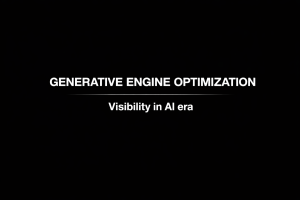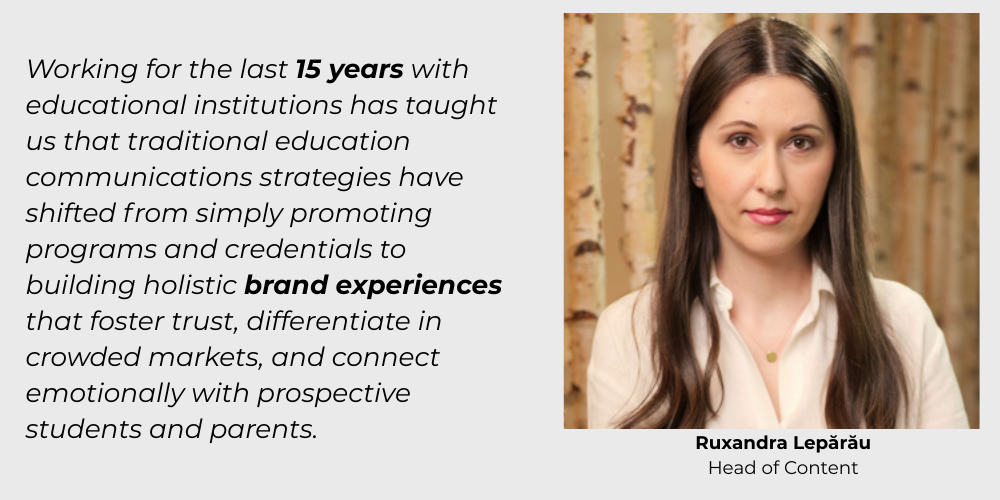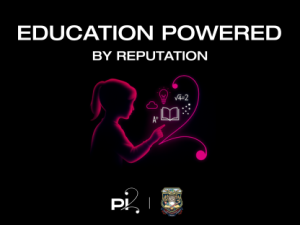

By Ruxandra Lepărău,
Head of Content
Working for the last 15 years with educational institutions has taught us that traditional education communications strategies have shifted from simply promoting programs and credentials to building holistic brand experiences that foster trust, differentiate in crowded markets, and connect emotionally with prospective students and parents. When an Executive MBA program may cost six figures and an international school competes with institutions across three continents, every communication touchpoint must demonstrate exceptional value.
Below, we summarize our core learnings and insights that define successful communications in elite education.
The audience’s expectations change everything. Working with elite educational institutions has reinforced that communications excellence is about a deep understanding of sophisticated audiences and their complex decision-making processes. Corporate executives evaluating EMBA programs aren’t impressed by generic “transformational learning” language—they want to know about specific career advancement outcomes and community networks. Similarly, parents aren’t just choosing a school; they’re making decisions that will impact their children’s university admissions across multiple countries.
Reputation is currency. In elite education, perception directly shapes outcomes. For example, when our Executive MBA client competed to enroll a prominent business leader, success depended on how effectively we communicated the program’s exclusive network and proven results. Likewise, when families explore international schools, they seek the reassurance that their choice will advance their children’s future, not limit it.
Balance exclusivity with accessibility – The scholarships’ challenge. When communicating scholarships, the messaging needs to attract diverse, high-achieving candidates without diluting the program’s premium positioning. Communication around this topic has to communicate the strategic investments in exceptional leaders who can bring extraordinary value added to the program and community.
Evidence-Based Storytelling. Both executives and international school parents are natural skeptics. They’ve seen enough marketing to recognize empty promises. Effective communications for premium education institutions must combine emotional resonance with concrete evidence.
Multi-Touchpoint Relationship Building. Premium education decisions aren’t made quickly. EMBA candidates often research programs for years before applying. International school families might evaluate options across multiple cities and countries before making decisions. We develop communication strategies that nurture relationships over extended timeframes, providing valuable insights and building trust at each interaction. This might involve executive thought leadership content for EMBA prospects or cultural transition resources for international school families.

Cultural intelligence. Our international school communications must resonate with families from diverse cultural backgrounds while maintaining consistent institutional messaging. This requires a deep understanding of different educational systems, cultural values, and communication preferences. For the Executive MBA program, we’ve learned that communications must speak to both local business cultures and international career aspirations, often within the same piece of content.
Authenticity beats perfection. Both executives and families of young children can spot inauthentic messaging immediately. The most effective communications acknowledge challenges while demonstrating how institutions address them.
Relationships matter more than transactions. Premium education is relationship-based. Alumni networks, parent communities, and professional connections extend far beyond graduation. Communications that recognize and nurture these extended relationships create lasting institutional value.
Global perspective is non-negotiable. Whether serving executives planning international careers or families navigating global relocations, communications must demonstrate genuine international expertise and cultural fluency.
Looking Forward
Educational institutions serving sophisticated audiences can’t afford communications that feel generic or outdated. The families considering international schools and professionals evaluating Executive MBA programs expect communications that match the premium experience they’re considering. This creates opportunities for institutions willing to invest in sophisticated communications strategies. When messaging resonates with audience aspirations and addresses real concerns, enrollment follows naturally. It’s not about selling education—it’s about demonstrating that choosing your institution is the smart decision for people who are accustomed to making smart decisions.
This article was published in RevistaBiz.ro.


